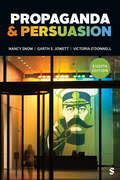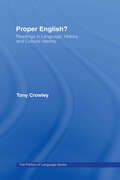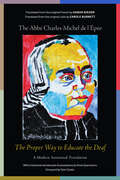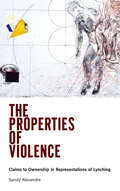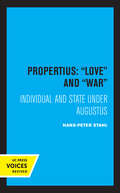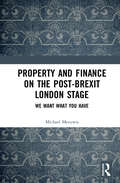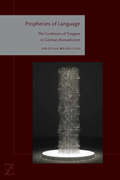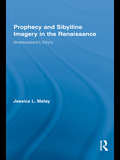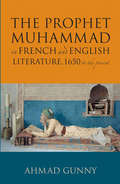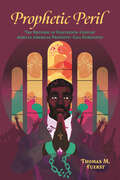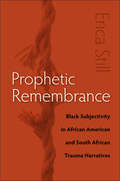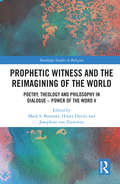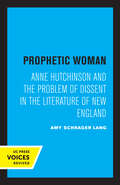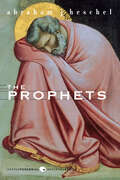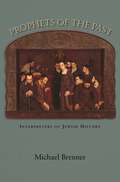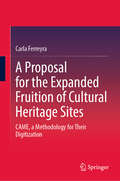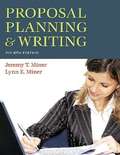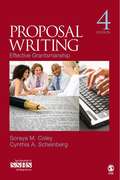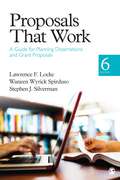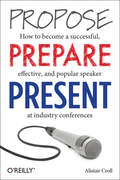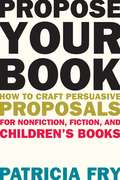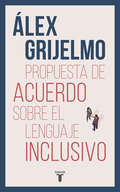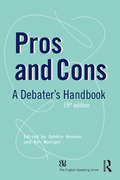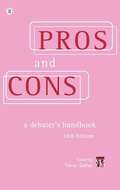- Table View
- List View
Propaganda & Persuasion
by Nancy Snow Garth S. Jowett Victoria O′DonnellPropaganda and Persuasion, Eighth Edition offers a comprehensive history of propaganda and introduces the tools and concepts used to analyze it. New author Nancy Snow ushers in fresh perspectives, experience, and insight as one of the foremost scholars in propaganda studies to further augment the ideas, concepts, and analytical framework introduced by original authors Garth Jowett and Victoria O′Donnell. Ideal for courses in Persuasion, Propaganda, or Political Communication, this book draws on examples from ancient times to present-day issues, such as the impact of social media, to help students recognize, understand, and analyze the instances of propaganda and persuasion they encounter in an increasingly complex and digitalized world.
Propaganda & Persuasion
by Nancy Snow Garth S. Jowett Victoria O′DonnellPropaganda and Persuasion, Eighth Edition offers a comprehensive history of propaganda and introduces the tools and concepts used to analyze it. New author Nancy Snow ushers in fresh perspectives, experience, and insight as one of the foremost scholars in propaganda studies to further augment the ideas, concepts, and analytical framework introduced by original authors Garth Jowett and Victoria O′Donnell. Ideal for courses in Persuasion, Propaganda, or Political Communication, this book draws on examples from ancient times to present-day issues, such as the impact of social media, to help students recognize, understand, and analyze the instances of propaganda and persuasion they encounter in an increasingly complex and digitalized world.
Proper English
by Tony CrowleyFirst published in 1991. Debates about the state and status of the English language are rarely debates about language alone. Closely linked to the question, what is proper English? is another, more significant social question: who are the proper English? The texts in this book have been selected to illustrate the process by which particular forms of English usage are erected and validated as correct and standard. At the same time, the texts demonstrate how a certain group of people, and certain sets of cultural practices are privileged as correct, standard and central. Covering a period of three hundred years, these writers, who include Locke, Swift, Webster, James, Newbolt and Marenbon, wrestle with questions of language change and decay, correct and incorrect usage, what to prescribe and proscribe. Reread in the light of recent debates about cultural identity - how is it constructed and maintained? what are its effects? - these texts clearly demonstrate the formative roles of race, class and gender in the construction of proper ‘Englishness' . Tony Crowley's introductory material breaks new ground in rescuing these texts from the academic backwater of the 'history of the language' and in reasserting the central role of language in history.
The Proper Way to Educate the Deaf: A Modern Annotated Translation
by The Abbé de l’EpéeThis volume presents the first complete English translation of the Abbé de l’Épée’s seminal work describing his methodology for educating deaf children. Originally published in French in 1798, this modern annotated edition offers readers a translation that is documentary in scope and that reflects historic attitudes toward deaf people and deaf education while maintaining the conventions of contemporary English. De l’Épée provides an anecdotal account of his methods and philosophy for educating deaf children using a sign system based on the French Sign Language of the era but adapted to visually represent the linguistic features of spoken and written French. His work laid the foundation for the use of the “manual method,” or sign language, in deaf education. One section of the text, originally published in Latin, outlines the intellectual clash between de l’Épée and Samuel Heinicke, an early proponent of oral education who contested the use of sign language. De l’Épée’s text holds significant cultural and historical value for the fields of deaf studies and deaf education. This English language translation reveals de l’Épée’s own story of how he came to be known as the “father of the deaf” and is enriched by scholarly contributions that provide essential historical context and a framework for modern understanding.
The Properties of Violence: Claims to Ownership in Representations of Lynching
by Sandy AlexandreThe Properties of Violence focuses on two connected issues: representations of lynching in late-nineteenth and twentieth-century American photographs, poetry, and fiction; and the effects of those representations. Alexandre compellingly shows how putting representations of lynching in dialogue with the history of lynching uncovers the profound investment of African American literature—as an enterprise that continually seeks to create conceptual spaces for the disenfranchised culture it represents—in matters of property and territory. Through studies ranging from lynching photographs to Toni Morrison's Pulitzer Prize-winning novel, Beloved, the book demonstrates how representations of lynching demand that we engage and discuss various forms of possession and dispossession. The multiple meanings of the word “representation” are familiar to literary critics, but Alexandre's book insists that its other key term, “effects,” also needs to be understood in both of its primary senses. On the one hand, it indicates the social and cultural repercussions of how lynching was portrayed, namely, what effects its representations had. On the other hand, the word signals, too, the possessions or what we might call the personal effects conjured up by these representations. These possessions were not only material—as for example property in land or the things one owned. The effects of representation also included diverse, less tangible but no less real possessions shared by individuals and groups: the aura of a lynching site, the ideological construction of white womanhood, or the seemingly default capacity of lynching iconography to encapsulate the history of ostensibly all forms of violence against black people.
Propertius: Individual and State under Augustus
by Hans-Peter StahlThis title is part of UC Press's Voices Revived program, which commemorates University of California Press’s mission to seek out and cultivate the brightest minds and give them voice, reach, and impact. Drawing on a backlist dating to 1893, Voices Revived makes high-quality, peer-reviewed scholarship accessible once again using print-on-demand technology. This title was originally published in 1985.
Property and Finance on the Post-Brexit London Stage: We Want What You Have
by Michael MeeuwisA guide to the contemporary London stage as well as an argument about its future, the book walks readers through the city’s performance spaces following the Brexit vote. Austerity-era London theatre is suffused with the belief that private ownership defines full citizenship, its perspective narrowing to what an affluent audience might find relatable. From pub theatres to the National, Michael Meeuwis reveals how what gets put on in London interacts with the daily life of the neighbourhoods in which they are set. This study addresses global theatregoers, as well as students and scholars across theatre and performance studies—particularly those interested in UK culture after Brexit, urban geography, class, and theatrical economics.
Prophecies of Language: The Confusion of Tongues in German Romanticism (Lit Z)
by Kristina MendicinoThe scenes of Babel and Pentecost, the original confusion of tongues and their redemption through translation, haunt German Romanticism and Idealism. This book begins by retracing the ways in which the task of translation, so crucial to Romantic writing, is repeatedly tied to prophecy, not in the sense of telling future events, but in the sense of speaking in the place of another—most often unbeknownst to the speaker herself. In prophetic speech, the confusion of tongues repeats, each time anew, as language takes place unpredictably in more than one voice and more than one tongue at once. Mendicino argues that the relation between translation and prophecy drawn by German Romantic writers fundamentally changes the way we must approach this so-called “Age of Translation.” Whereas major studies of the period have taken as their point of departure the opposition of the familiar and the foreign, Mendicino suggests that Romantic writing provokes the questions: how could one read a language that is not one? And what would such a polyvocal, polyglot language, have to say about philology—both for the Romantics, whose translation projects are most intimately related to their philological preoccupations, and for us? In Prophecies of Language, these questions are pursued through readings of major texts by G.W.F. Hegel, Wilhelm von Humboldt, Friedrich Schlegel, and Friedrich Hölderlin. These readings show how, when one questions the presupposition of works composed by individual authors in one tongue, these texts disclose more than a monoglot reading yields, namely the “plus” of their linguistic plurality. From such a surplus, each chapter goes on to advocate for a philology that, in and through an inclination toward language, takes neither its unity nor its structure for granted but allows itself to be most profoundly affected, addressed—and afflicted—by it.
Prophecy and Sibylline Imagery in the Renaissance: Shakespeare’s Sibyls (Routledge Studies In Renaissance Literature And Culture Ser. #15)
by Jessica L. MalayThis book restores the rich tradition of the Sibyls to the position of prominence they once held in the culture and society of the English Renaissance. The sibyls — figures from classical antiquity — played important roles in literature, scholarship and art of the period, exerting a powerful authority due to their centuries-old connection to prophetic declamations of the coming of Christ and the Apocalypse. The identity of the sibyls, however, was not limited to this particular aspect of their fame, but contained a fluid multi-layering of meanings given their prominence in ancient Greek and Roman cultures, as well as the widespread dissemination of prophecies attributed the sibyls that circulated through the oral tradition. Sibylline prophecy of the Middle Ages served as another conduit through which sibylline authority, fame, and familiarity was transmitted and enhanced. Writers as disparate as John Foxe, John Dee, Thomas Churchyard, John Fletcher, Thomas Heywood, Jane Seager, John Lyly, An Collins, William Shakespeare, and many draw upon this shared sibylline tradition to produce particular and specific meanings in their writing. This book explores the many identities, the many faces, of the prophetic sibyls as they appear in the works of English Renaissance writers.
Prophet Muhammad in French and English Literature
by Ahmad Gunny"Gunny, a pioneer in the study of French and European literary and theological representations of Islam in the modern period, offers a survey of over 350 years, which is both a cross cultural history and a discussion of the intellectual changes in the representation of the Prophet's life based on the examination of original published and unpublished manuscripts." -Islamic Horizons"Ahmad Gunny has been a pioneer in the study of French and European literary and theological representations of Islam in the modern period. Thanks to his acclaimed critical studies, students and scholars alike have found in his work new and important directions for research." -Nabil Matar, professor, University of MinnesotaThis magisterial survey of the Prophet Muhammad over three hundred and fifty years is both a cross cultural history and a discussion of the intellectual changes in the representation of the Prophet's life based on the close examination of original published and unpublished manuscripts.Ahmad Gunny is fellow and senior associate at the Oxford Centre for Islamic Studies.
Prophetic Peril: The Rhetoric of Nineteenth-Century African American Prophetic-Call Narratives (Race, Rhetoric, and Media Series)
by Thomas M. FuerstProphecy reimagines the world. It critiques what is and encourages its audience to imagine what could be. All prophecy, therefore, begins with a person willing to reimagine their own situation. In the biblical and African American traditions, this person receives a “call” to prophetic ministry that upends their reality and compels them to change the way things are. Prophetic Peril: The Rhetoric of Nineteenth-Century African American Prophetic-Call Narratives invites readers into the imaginative, subversive, and ethically complicated stories of four nineteenth-century Black figures who received the call to challenge the what is and live into the what could be in the midst of a hard-hearted world. Focusing on the prophetic-call narratives of Maria Stewart, Nat Turner, Julia Foote, and Richard Allen, author Thomas M. Fuerst offers insight into the unique contributions this tradition makes to American oratory, storytelling, history, ethics, theology, and protest. As Fuerst demonstrates, Turner’s call narrative subverts white, political interests and expands politics to include the resistance rhetoric and witness of those on the margins. Allen’s apologetic narration combines deeply thoughtful Protestant exegesis with a liberation theology shaped by the experience of enslavement, anchoring his rhetorical power in the experience of Black people in the nineteenth century. The call narratives of Stewart and Foote circumvent patriarchy and resist patriarchal interpretations of the Bible through biblical, embodied, dramatic, visionary appeals that sidestep persuasion and demand either acceptance or rejection. Taken together, these case studies reveal how antebellum Black preachers used religious storytelling to resist white, patriarchal oppression and assert their own voices, offering unique insight to our understanding of prophecy and resistance.
Prophetic Remembrance: Black Subjectivity in African American and South African Trauma Narratives
by Erica StillUsing the term "prophetic remembrance" to articulate the expression of a constituent faith in the performative capacity of language, Erica Still shows how black subjectivity is born of and interprets cultural trauma. She brings together African American neo-slave narratives and Black South African postapartheid narratives to reveal the processes by which black subjectivity accounts for its traumatic origins, names the therapeutic work of the present, and inscribes the possibility of the future. The author draws on trauma studies, black theology, and literary criticism as she considers how writers such as Toni Morrison, Charles Johnson, John Edgar Wideman, David Bradley, Sindiwe Magona, K. Sello Duiker, and Zakes Mda explore the possibilities for rehearsing a traumatic past without being overcome by it. Although both African American and South African literary studies have addressed questions of memory, narrative, and trauma, little comparative work has been done. Prophetic Remembrance offers this comparative focus in reading these literatures together to address the question of what it means to remember and to recover from racial oppression.
Prophetic Witness and the Reimagining of the World: Poetry, Theology and Philosophy in Dialogue- Power of the Word V (Routledge Studies in Religion)
by Mark S. Burrows Hilary Davies Josephine Von ZitzewitzThis book explores the prophetic characteristics of literature, particularly poetry, that seek to reimagine the world in which it is written. Using theological and philosophical insights it charts the relentless impulse of literature to propose alternative visions, practicable or utopian, and point toward possibilities of renewal and change. Drawing from each of the three main Abrahamic religions, as well as Greek and Latin classics, an international group of scholars utilise a diverse range of analytical and interpretive methods to draw out the prophetic voice in poetry. Looking at the writings of figures like T. S. Elliot, Blake, Wittgenstein and Isaiah, the theme of the prophetic is shown to be of timely importance given the current state of geo-political challenges and uncertainties and offers a much-needed critical discussion of these broad cultural questions. This collection of essays offers readers an insight into the constructive power of literature. As such, it will be of great interest to scholars working in Religion and the Arts, Religious Studies, Theology and Aesthetics.
Prophetic Woman: Anne Hutchinson and the Problem of Dissent in the Literature of New England
by Amy Schrager LangThis title is part of UC Press's Voices Revived program, which commemorates University of California Press’s mission to seek out and cultivate the brightest minds and give them voice, reach, and impact. Drawing on a backlist dating to 1893, Voices Revived makes high-quality, peer-reviewed scholarship accessible once again using print-on-demand technology. This title was originally published in 1987.
The Prophets (Perennial Classics Ser.)
by Abraham J. HeschelThe enduring masterpiece on the Old Testament prophets from the legendary twentieth-century Jewish theologian and author of the classics works Man Is Not Alone and God in Search of Man.“A brilliant study of the Hebrew prophets, one of the most penetrating works . . . [of] our time.”— Will HerbergWhen it was first published in 1962, The Prophets was hailed as a masterpiece. Since then, Heschel's classic work has stood the test of time. The Prophets provides a unique opportunity for readers of all faiths to gain a fresh perspective and deep knowledge of the Old Testament and Israel’s ancient prophetic movement. Heschel’s profound understanding of the prophets and detailed examinations of them, including Amos, Hosea, Isahiah, Micah, and Jeremiah, offers crucial insights into the philosophy of religion that continue to hold relevance for modern scholars and laymen alike.
Prophets of the Past: Interpreters of Jewish History
by Michael BrennerProphets of the Past is the first book to examine in depth how modern Jewish historians have interpreted Jewish history. Michael Brenner reveals that perhaps no other national or religious group has used their shared history for so many different ideological and political purposes as the Jews. He deftly traces the master narratives of Jewish history from the beginnings of the scholarly study of Jews and Judaism in nineteenth-century Germany; to eastern European approaches by Simon Dubnow, the interwar school of Polish-Jewish historians, and the short-lived efforts of Soviet-Jewish historians; to the work of British and American scholars such as Cecil Roth and Salo Baron; and to Zionist and post-Zionist interpretations of Jewish history. He also unravels the distortions of Jewish history writing, including antisemitic Nazi research into the "Jewish question," the Soviet portrayal of Jewish history as class struggle, and Orthodox Jewish interpretations of history as divinely inspired. History proved to be a uniquely powerful weapon for modern Jewish scholars during a period when they had no nation or army to fight for their ideological and political objectives, whether the goal was Jewish emancipation, diasporic autonomy, or the creation of a Jewish state. As Brenner demonstrates in this illuminating and incisive book, these historians often found legitimacy for these struggles in the Jewish past.
A Proposal for the Expanded Fruition of Cultural Heritage Sites: CAME, a Methodology for Their Digitization
by Carla FerreyraThis book presents a comprehensive methodology, integrating analysis, digitization, and the preservation of cultural heritage. It investigates three potential UNESCO World Heritage Sites, in Italy, Germany and South Africa, and employs a blend of documentary research and advanced digital surveying and data processing techniques. The volume shows how these efforts yielded actionable strategies to meet society's evolving demands for surveying, recovery, and conservation. The book documents the work behind the overarching objective which was to digitize, analyze, categorize, and store all collected data within a BIM framework, with the aim of streamlining collaboration, enhancing management efficiency, and optimizing processes. It demonstrates the utilization of digital tools in not only amplifying traditional scientific-technological approaches to heritage protection, but also its role in reshaping the perception, comprehension, and communication of heritage. This fosters the development of more sustainable conservation strategies.
Proposal Planning and Writing
by Jeremy T. Miner Lynn E. MinerGives grant seekers practical advice and numerous examples to assist them in planning and writing proposals, with special attention to the availability of information on the Internet.
Proposal Writing: Effective Grantsmanship (Fourth Edition)
by Soraya M. Coley Cynthia A. ScheinbergClear, easy-to-understand, and jargon-free, this updated Fourth Edition of Proposal Writing: Effective Grantsmanship offers a step-by-step guide to writing a successful grant proposal to meet community needs. Throughout the book, the authors provide a guided process to assist the new grantwriter in understanding how to find grant opportunities, how to develop a viable project and evaluate outcomes, and how to prepare an application for funding. The book is written for employees in the non-profit sector who are asked to write a proposal and for students who may ultimately have careers that require this skill.
Proposals That Work: A Guide for Planning Dissertations and Grant Proposals
by Stephen J. Silverman Lawrence F. Locke Waneen Wyrick SpirdusoPrevious editions of this book have helped well over 100,000 students and professionals write effective proposals for dissertations and grants. Covering all aspects of the proposal process, from the most basic questions about form and style to the task of seeking funding, Locke/Spirduso/Silverman’s Proposals That Work offers clear advice backed up with excellent examples. In the fifth edition, the authors have included a discussion of the effects of new technologies and the Internet on the proposal process, with URLs listed where appropriate. In addition, there are new sections covering alternative forms of proposals and dissertations and the role of academic rigor in research. As always, the authors have included a number of specimen proposals, two that are completely new to this edition, to help shed light on the important issues surrounding the writing of proposals. Clear, straightforward, and reader friendly, Proposals That Work is a must own for anyone considering writing a proposal for a thesis, a dissertation, or a grant.
Propose, Prepare, Present: How to become a successful, effective, and popular speaker at industry conferences
by Alistair CrollEvery year, tens of thousands of companies—from industry giants to aspiring upstarts—apply to speak at conferences. They pump millions of dollars into these events, hoping to find new customers, strengthen their brand, and meet new partners. Sadly, for most of them, things don’t go that way. Submitted topics aren’t chosen; when they are, they come across as tone-deaf sales pitches.What does it take to be chosen to speak—and to rock the mic when given the chance? This book takes you behind-the-scenes of the conference process, showing you how to submit, plan, and deliver a talk that matters. Event organizer Alistair Croll provides many examples based on his experience with a wide range of conferences, including O’Reilly’s Strata, Velocity, Web2Expo, and TOC Conferences.Learn 11 items that help your submission stand out—and 11 items that will get it tossedExplore the hurdles your proposal has to clear before it’s acceptedTailor your talk to a conference’s topics and themesDiscover why images work better than words in your slide deckAchieve your business goals by engaging the audience before, during, and after your talk"We’ve been running successful events worldwide for over a decade, and the simple truth is that the people who get chosen, and give great presentations, follow the rules in this book."--Gina Blaber, VP Conferences, O’Reilly Media
Propose Your Book: How to Craft Persuasive Proposals for Nonfiction, Fiction, and Children?s Books
by Patricia FryAuthors are the CEOs of their books, and their book proposals are their business plans. Most agents and publishers require a proposal before ever setting eyes on a manuscript, and it is a crucial element in getting published. Writing a proposal can also help an author to write the right book for the right audience, and to more successfully pitch a book to the right agent or publisher. Propose Your Book offers a clear understanding of the book proposal process in today’s fiercely competitive publishing climate. It includes: The most up-to-date concepts in writing a book proposal Insider tips from the agents and publishers Examples of actual proposals from publishers’ files Covering proposals for nonfiction, fiction, and children’s books, Patricia Fry provides a hands-on approach from an experienced writer’s perspective. Propose Your Book, enriched with innovative and tried-and-true strategies, is a complete guide to perfecting contemporary proposals that will sell writers’ books.
Propuesta de acuerdo sobre el lenguaje inclusivo
by Álex Grijelmo¿El idioma invisibiliza a la mujer? ¿Es compatible la lucha feminista con el respeto al sistema de la lengua? ¿Tiene sentido que el masculino genérico se presente como símbolo de la dominación del varón? ¿Es eficaz actuar sobre el lenguaje para combatir el machismo? Este libro ha sido concebido con espíritu conciliador y divulgativo para acercar posiciones distantes, sin que ello suponga dar por buenos ciertos tópicos que se han ido imponiendo a fuerza de repetirse. Ante un debate tremendamente apasionado, Álex Grijelmo muestra los aciertos pero también las contradicciones y los excesos, y tiene la sensibilidad, la independencia y la solidez necesarias para aportar claridad y sentido común. Algunos de los problemas que denuncia el feminismo sí se hallan en fenómenos de lengua, pero los más criticables (los refranes, los dichos o la perspectiva androcentrista que, a menudo sin darnos cuenta, aplicamos al hablar) no son necesariamente los que más se combaten. Frente al ruido relacionado con el lenguaje inclusivo, Grijelmo presenta un recorrido descomplicado, revelador, ameno y repleto de ejemplos; y ofrece una serie de propuestas que no pretenden decir la última palabra sino ofrecer un documento de trabajo para quienes quieran contribuir al debate con nuevas argumentaciones. Reseñas:«Merece toda nuestra atención.»Juan Luis Cebrián, El País (Babelia) «Nuestros textos se enriquecerían si prestáramos atención a las reflexiones de Álex Grijelmo.»Soledad Gallego-Díaz, El País «Un libro didáctico que se lee con la pasión de una novela.»Gabriel García Márquez, sobre El estilo del periodista
Pros and Cons: A Debaters Handbook
by Debbie Newman Ben WoolgarPros and Cons: A Debaters Handbook offers a unique and invaluable guide to the arguments both for and against over 140 current controversies and global issues. Since it was first published in 1896 the handbook has been regularly updated and this nineteenth edition includes new entries on topics such as the right to possess nuclear weapons, the bailing out of failing industries, the protection of indigenous languages and the torture of suspected terrorists. <P><P> Equal coverage is given to both sides of each debate in a dual column format which allows for easy comparison. Each entry also includes a list of related topics and suggestions for possible motions. <P><P> The introductory essay describes debating technique, covering the rules, structure and type of debate, and offering tips on how to become a successful speaker. The book is then divided into eight thematic sections, where specific subjects are covered individually.
Pros and Cons: A Debater's Handbook (18th edition)
by Trevor SatherPros and Cons provides material for debates on a wide range of questions: arguments for and against appear in adjacent columns, numbered point by point, so that each "Pro" corresponds with the "Con" of the same number.
